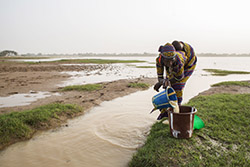Background
 Agriculture plays an important role in the Nigerien economy, representing 37% of the Gross Domestic Product, while the total cultivable area represents less than 12% of the territory. Agriculture is mainly dominated by smallholder farmers operating on significantly small land holdings. Agricultural techniques which are in use in the country are very traditional. Almost all cultivated land is occupied by rainfed crops, mainly millet, sorghum and cowpea, and to a lesser extent, cassava. Eighty five per cent of the production is self-consumed. Peanut and cotton, which were previously major export crops, now contribute only marginally to the economy. The random rains upon which the Nigerien agriculture remains largely dependent, have recently been repaid by persistent drought. This combined with poor soils are factors limiting agricultural productivity. Millet, the most resistant cereal to drought, represents almost two thirds of the total agricultural production.
Agriculture plays an important role in the Nigerien economy, representing 37% of the Gross Domestic Product, while the total cultivable area represents less than 12% of the territory. Agriculture is mainly dominated by smallholder farmers operating on significantly small land holdings. Agricultural techniques which are in use in the country are very traditional. Almost all cultivated land is occupied by rainfed crops, mainly millet, sorghum and cowpea, and to a lesser extent, cassava. Eighty five per cent of the production is self-consumed. Peanut and cotton, which were previously major export crops, now contribute only marginally to the economy. The random rains upon which the Nigerien agriculture remains largely dependent, have recently been repaid by persistent drought. This combined with poor soils are factors limiting agricultural productivity. Millet, the most resistant cereal to drought, represents almost two thirds of the total agricultural production.
